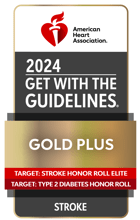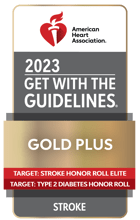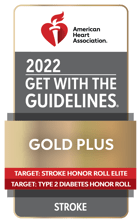Stroke Center
Certified Stroke Center
A stroke occurs when circulation of blood and nutrients to the brain fails. There are two basic categories of stroke: those caused by a blockage of blood flow (ischemic stroke) and those caused by bleeding in or around the brain (hemorrhagic stroke). When a stroke happens, part of the brain cannot get the oxygen it needs and begins to deteriorate. Your doctor will tell you what type of stroke you have had and talk with you about your treatment and rehabilitation.
Some people have stroke symptoms that last only a short time and then go away on their own. This is called a transient ischemic attack or TIA. A TIA is a sign that you have a serious medical problem that is likely to progress to a stroke in the future. Anyone experiencing signs of a stroke or seeing warning signs of a stroke in someone else should call 9-1-1 immediately.
Stroke Certified
 Salinas Valley Health’s proven expertise in caring for people who
have had a stroke has earned us special advanced certification from The
Joint Commission as a Primary Stroke Center. We are also designated as
a Stroke Receiving Center for Monterey County. This means that we have
a special team to provide rapid diagnosis and treatment for stroke patients,
designated areas in the medical center with specially trained staff to
care for patients with stroke, and integrated services from several departments
throughout our medical center. We have gone a step above these certification
requirements by having local neurologists cover all of our stroke patients
during hospitalization and by making appointments with a local neurologist
for patients following discharge.
Salinas Valley Health’s proven expertise in caring for people who
have had a stroke has earned us special advanced certification from The
Joint Commission as a Primary Stroke Center. We are also designated as
a Stroke Receiving Center for Monterey County. This means that we have
a special team to provide rapid diagnosis and treatment for stroke patients,
designated areas in the medical center with specially trained staff to
care for patients with stroke, and integrated services from several departments
throughout our medical center. We have gone a step above these certification
requirements by having local neurologists cover all of our stroke patients
during hospitalization and by making appointments with a local neurologist
for patients following discharge.




Know the Signs of a STROKE
Knowing the FAST acronym can help you identify symptoms and have the best chances of mitigating the stroke.
F– Facial drooping. Watch for any part of the face to go slack.
A– Arm weakness. Note any lack of control.
S– Speech disturbances. Listen and watch for slurred speech or difficulty forming words.
T– Time is extremely important. Call 911.
Many times, doctors are able to interrupt the stroke or lessen its consequences—but only when immediate action is taken.
Know the Signs of a STROKE
Know the Signs of a HEART ATTACK



